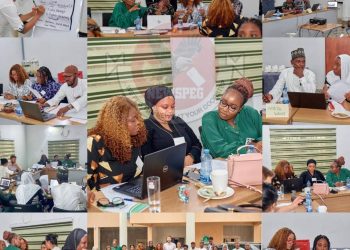By Nkechi Eze
A woman is pre-conditioned from birth to be: the weaker sex; the primary care giver; a helpmate, a second-class citizen in a patriarchal society. The diverse roles foisted on her only serve to underline her disadvantage as a woman. Nigerian women had until few decades ago lived as wives and mothers in a full-time capacity, taking care of the home and their children. The man was traditionally cast in the role of breadwinner. Colonial heritage served to solidify what was already rooted in culture. Many of the jobs were the exclusive preserve of men. The imbalance in the ratio of men to women in paid employment was staggering and even in recent times, the gap is barely closing. In the 2018 report of the World Economic Forum, Nigeria ranked 133 in closing the gender gap among work managers and legislators. This is a drop from its 2017 ranking of 122 out of 144 countries, Nkechi Eze writes.
In Nigeria, Women make up almost half of the workforce, yet they continue to earn less than men on average in nearly every single occupation for which there is sufficient earnings data for both men and women.
According to the World Bank collection of development indicators, compiled from officially recognized sources, the percentage of wage and salaried female workers in Nigeria was reported at 14.18 % in 2022,
The pace of progress towards pay equity has been slow, and if progress continues at the same pace, it will take until 2059 for women to finally reach pay equality. Despite being paid less, women’s earnings are increasingly important to the economic stability of families.
Some households with children under 18 have a breadwinner mother, who is either a single mother who heads a household, regardless of earnings, or a married mother who provides at least 40 percent of the couple’s joint earnings.
Many women without children, both single and married, work to support themselves and other family members. Thus, persistent earnings inequality for working women translates into lower pay, less family income, and more children and families in poverty.
The invisible barriers to women’s poor remunerations and its effects on household extends all the way from the “glass ceiling” at the top of the nation’s largest corporations to the “sticky floor” of low-paying, low-mobility jobs at the bottom of the labour market.
These barriers are created by a process of exclusionary practices that successively eliminate women, for higher positions. Barriers exist in the structure of work organizations, in the structure of the educational and economic systems, and in the larger social order.
It is an established fact that paying women less than men, contributes to women’s vulnerability, lack of educational and career achievement, and a higher incidence of relative poverty later in life. Lower earnings also make it harder for women to take care of their families, especially single mothers. A large body of international and national laws prohibit the discrimination against women of any kind, especially relating to salary and wages.
In 1990, the Abuja Environmental Protection Board (AEPB) was set up to undertake waste management and other environmental protection activities to keep Abuja clean and shore up its image as a modern and cosmopolitan city.
In order to achieve a clean environment, through proper city cleaning, the AEPB employed women and men for the job.
Rosemary Victor (41), a mother of three, joined the job in 2021, in order to assist her husband a gardener and a car washman, to provide for the family.

An uncle, a civil servant, enrolled her in the scheme.
“My last child was only three years old when I decided to join this sweeping job, I have three children 13, 7 and 3 years old” Mrs Rosemary narrated.
As early as 5:30a.m, she would leave her house at Karimo, close to Gwa Gwa area, and walk a short distance to the bus stop, where she boards a vehicle every day to Utako, her place of assignment.
Each of these street sweepers has specific locations and portions on the street allocated to them that must be kept clean daily. These women work round the clock – no break, no holidays. Every day, they must sweep their apportioned areas, which is usually about 1km.
“The N28,000 we get as salary is not enough, so I also got another sweeping job at Jabi garage. I and two other women got the job through the garage chairman, and we are paid 13,000. I also pick rubber bottles on the road and at construction sites, to sell, in order to support me and my family,” she said.
When asked if there are men on the job and what they earn, Rosemary hinted that there are men, “the job of the men is to pack the dirt we gather after sweeping, they come in big vehicles after we have swept, to park the dirt. The men’s job is not as stressful as our own because we are always on our feet, with our backs bent, sweeping long distance, but the men come in big vehicles, to pack the dirty and leave and they pay them more than the we the women that sweep. The men are paid 32,000” she said.
According to Rosemary, a large chunk of the money she makes is spent on food. She lamented on the high cost of food in the market.
Rifkatu Danjuma (45), mother of five, petty trader, who sells various type of kunu is faced with the challenge of proper home management, due to her very low income.

According to Rifkatu, “I used a total of 10,000 as capital to start the business, and on days that I make good sales, I go home with 6,000. I have worked as a cleaner in an office, I did the job for close to 7 years. I had to stop because the pay was not even taking care of my transportation to the office. I have five children, some are half way educated, my two daughters are married. My eldest son has an OND, but yet to continue to get his HND. My junior son has his WAEC.
When asked about her husband and his contributions at home, Rifkatu said “my husband has another wife, he moved out of the house to live with her and does not support me in any way. I am the first wife. Taking care of the home front with my little income has been very challenging, especially with the rising cost of everything in the market. I face a lot of challenges doing this kunu business, there is the problem of light, to help preserve the kunu, some kunu cannot stay without light and if after making it, because of the light situation, I am unable to get ice blocks to keep it cold, it gets spoiled, and that is a huge loss for me, because the effect of this loss is always felt in the house. It is that little money I make every day that I feed my children with. There is also the issue of low sales, sometimes I make kunu and I don’t sell.
When asked about her educational background and if she would like to work in an office, she said “I have secondary school certificate and I wish my father allowed me to further my education, maybe I would have gotten an office job and life would have been better for me and my children. When I was growing up, my father invested more of his money training his sons, he only managed to train his daughters, I and my two sisters to secondary school level and after we wrote our exams, that was the end of our education. I tried so hard to make sure my daughters get educated, but the situation of things in my life did not make it possible and I feel sad about it”
Boluwatife Okegbemi (31), a product designer specialized in UI/UX design said “as a female Nigerian UI/UX designer it is no walk in the park. I face a unique set of challenges that can make even the calmest of female pull out her hair, but the reoccurring challenge is being the only female in my work team. This sometimes leads to my contribution been overlooked or undervalued, even when i have valuable input to offer. Additionally, balancing assertiveness with the stereotype of being too aggressive is always constant. But in all, i thrive and produce top-notch designs that wow my clients.
In the organization I work for, most times, I feel unnoticed, especially when it comes competing with my male colleagues for international projects or being featured in global design publications.
When asked about the challenges faced while job hunting, she said “one of the significant challenges I faced while job hunting was dealing with rejection, especially because I am a woman in this profession. It was always disheartening to receive these rejections especially when I felt well-qualified for the positions I applied for. Each rejection however, became a learning opportunity for me, helping my portfolio and interview skills”
With regards to receiving the same take home pay as the men in her profession, Boluwatife said “there is a noticeable disparity in the compensation between herself and her male counterparts, even though they perform the same roles and have same experience”.
On the issue of gender bias when dealing with clients, Boluwatife said she has noticed a lot of gender bias when dealing with clients. “Often, as the only female on the team, I noticed that clients deliberately overlook me and direct their questions or concerns to my male colleagues, even when I am equally very qualified to address their issues.
“Handling these biases can be quite challenging. I try to address them by being proactive and assertive in meetings, ensuring my voice is heard. I also make it a point to follow up on discussions and assert my expertise politely but firmly. I build strong relationship with clients, through consistent and high-quality work” she said.
Binta Luka (30), a skilled farmer is relegated to lower-paying farming work, while men dominate higher-paying roles in the agricultural industry. This limits her earning potential and ability to invest in her family well-being.

According to Binta, she began going to the farm at age 8. “I accompany my parents to the farm, with my sisters and brother. When we get to the farm, we (the girls) are relegated to manual labour-intensive tasks like weeding, harvesting and processing, while the men (my brothers) are told to handle mechanized tasks like planting and ploughing. We are not always involved in decision making, when it comes to farm management, resource allocation and finances.
“Another thing I noticed is that when maybe the government or organizations that wants to help farmers, requests that farmers be sent to them for training, they always send mostly the men. Here, we the women have limited access to agricultural training and the use of technology. This alone, hinders our productivity and efficiency”.
When asked about female representation in Agricultural Organizations, she said “I feel if we have more representation in agricultural organizations, decision making and policy making processes, our voices will be heard and some of these biases, especially that of limited ownership and control over the land we land we farm on, which makes us vulnerable to displacement and loss of investment, also issue of limited access to essential resources like seeds, fertilizers, equipment’s, which are often controlled by the men, will be curbed.
Nigeria ranked 134th in educational attainment, 50th in economic participation and opportunity, 141 in political empowerment, and 97th in health and survival
According to the report, gender gaps in wealth accumulation can be attributed to the underlying gender gap in the labour force. Although the margin between the male and female labour force in Nigeria is not wide and has also gotten better with increased labour participation of women over the years, the payment for labour of women is relatively low compared to that of males across all occupations.
The latest report from the World Gender Gap report 2022 showed the ranking of Nigeria at 123rd with a score of 0.639 out of a total of 146 countries. Parameters used include economic participation and opportunity, educational attainment, health and survival, political appointment and financial exclusion/wealth accumulation of the female gender in the world.
Although Nigeria moved 16 places up in the new ranking of the global gender gap index compared to 2021, it still has a gender gap of 63.9%. Nigeria has stayed between 60-63% in the last decade on all the sub-indexes, from political participation to economic participation
Nigeria has less than 65% wealth equality. The factors responsible for the inequality in wealth are; gender pay gaps, gender gaps in financial literacy, life events that influence women’s participation in paid work and ability to accumulate wealth.
The story of Boluwatife, Rifkatu, Binta and Rosemary are only but a few. These women reflect thousands of working women facing barriers of poor remuneration.
A close source to AEPB disclosed that women in the AEPB do the same job as the men and they earn the same salary. “Our job is that of hierarchy, a level 10 male officer earns same as a level 10 female officer” he said. When asked about how the city cleaners are being paid, he said “the AEPB outsourced the job of the city cleaning, it has been delineated into lots, companies bid for these jobs and the qualified ones are commissioned. They are the ones to employ those who do the job”.
“Women should hold the government accountable and also agitate for hygiene/sanitary pad allowance, some important facilities in their place of work, like crèche etc to make life easy for them, as this could also promote economic empowerment and well-being for women and their households” he said.
A Gender Advocate from the Center for Women Equality, who spoke on the condition of Anonymity opined that “If the government can formulate targeted policies and anti-discrimination laws that aim to close the gender pay-gaps within the economy, there would be clear increases in women’s ‘take-home pay and the direct impact of this (at least at the initial level of wages) will be a boost to family income. This higher level of income also leads to a higher level of private savings and higher private capital stock which has a direct positive effect on growth, which in turn brings higher tax revenues that benefits the country as a whole. Higher tax revenues lead to higher public spending in important sectors such as health, leading to a boost on infant and maternal health. A reduction in gender bias and a targeted increase to promote women’s inclusion within the economy leads to an increase in economic growth.
Gender disparities within employment and income have been found to reduce the bargaining power of women within the household. However, the greater a women’s bargaining power, the more productive household spending is, especially in terms of the health and education of future generations”.
Mrs Christiana Eguma, project coordinator, Women Rights Advancement and Protection Alternative (WRAPA) said that barriers to women’s equal pay includes cultural and social norm. According to her, “Lack of proper education may hinder women from getting the dream job they desire, and even for the educated women, there is still culture bias that hinders them from working and earning properly. Restrictions act as barriers to women because once there are restrictions; your full potentials cannot be attained”.

“In this part of the world, teaching profession is a low paying job that has been relegated to the women. Women are mostly not given the opportunity to compete for higher paying jobs”.
There is also the issue of occupational segregation, institutional barrier educational disparity etc, which is due to limited access to education for some women, which makes them less skilful and left without any knowledge or training to be able to get higher paying job.
While Speaking on Societal Norms and Stereotypes that perpetuate gender pay gap, Mrs Christiana opined that some of the societal norms have gender rules. In some families, there are some jobs that are for the female, while some are strictly for the male. From the house chores, you will find out the boys tend to go out to play, while the girls are made to work hard and keep the home clean, which can also affect her education, because she spends a lot of time doing house chores.
There is also the issue of early marriage for the girls, which is mostly practiced in the North, the girl may want to further her education, but she is told she cannot, because she needs to get married. In the South-South, there are also cases of money marriage, a situation where marrying out their daughters is used to settle debts. It differs in different parts of the country. There is also the issue of resistance to change, even when you reach out to them, to sensitise them on reasons why girls should go to school, they still have that fight back of saying “yes, okay, she can go to school, but still she cannot do certain things”.
This has happened for too long and the patriarchy society makes like a norm. Each time women demand for an equal playing ground, she is termed as “getting out her normal role”.
On the role policy makers and the government can play in addressing gender pay gap and promote equal pay for women, Christiana called for legislation and policy implementation. “Nigeria has too many legislations but our problem is the implementation of these policies. Without implementation, these policies are as good as just a piece of paper. There is also need for the government to conduct proper advocacy and awareness raising programmes to ensure that people know about them and work with it, because some people do not know these policies exist. Access to Finance for women, ensuring that there are no discriminations in laws, ensuring that every government agency and male politicians have no discrimination that limits women”.
Some of the strategies we (civil societies) use to address the disparities in gender pay gap are through advocacy, sensitization and awareness raising. We try to bring that consciousness to women that as a woman, you have a right, and these rights can be enforced through proper dialogue. It is important for women to form group to dialogue with policy makers for a shift in some of these patterns.
Alhaji Yusuf Mohammed Amin, Director Industrial relations and Trade Union Services in his reaction noted that there are labour laws protecting the rights of women at work. Section 54 of the Labour Act states that a woman has the right to maternity leave, and within that time of her leave, she is not permitted to work. Section 57 of the Labour Act also prohibits women under certain health conditions from undertaking specific hard jobs like underground mining. Section 55 is also there for the protection of women from working at night in a public, private industrial undertaking or in any agricultural setting.

We also have conventions to address issues of gender bias. “there was a recent convention, C-190 which specifically addresses issues about gender, especially the harassment women face at their place of work. The C-190 is one of the prominent conventions aimed at tackling issues women face at work.
The Ministry of Labour and the Federal Government recently launched “Decent work Country Programme 3”. This programme is basically aimed at the general protection of Workers. It clearly states that a worker entitled to his wages, a worker should be provided with protective work gadgets, a worker is supposed to work under decent conditions and a worker is supposed to be remunerated, irrespective of gender.
While speaking on education and skills, Alhaji Yusuf said these play very important roles with regards to women’s remunerations. “your education and skills will determine your take home. A male doctor will most certainly earn more than a female office clerk”.
“We will continue to be committed to addressing problems affecting women, especially issues of remuneration because there are lots families that solely depend on joint monetary contribution to run the affairs of the home. Yes there are some that do not really need the contribution of the woman, because the man provides everything, but this does not change the fact that poor remuneration of the women can affect the house hold” he said.
“this investigation is for the GENDER, THE AGENDA project for Gender Strategy Advancement International (GSAI) supported by the Wole Soyinka Center for Investigative Journalism (WSCIJ), and the MacArthur Foundation”.















Women should work hard enough to get whatever they want. We can already see Madam Okonji Iweala doing it.
It is obvious there is a gap in achieving equal pay for women. Women should keep on calling on relevant authorities to strike a balance in all spheres of life.